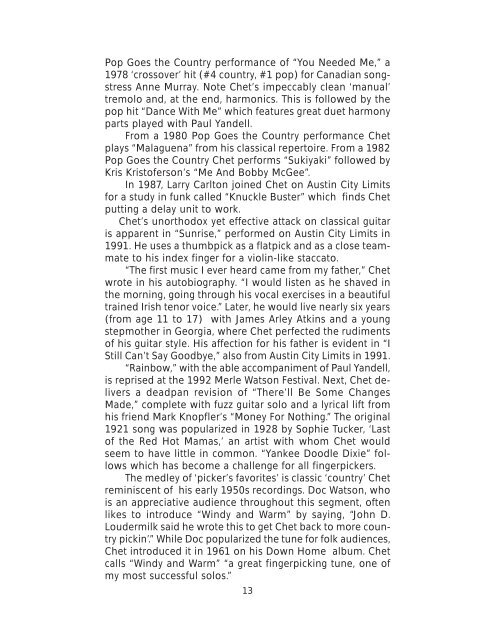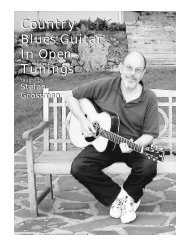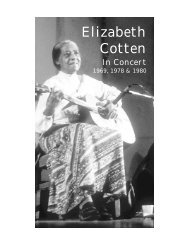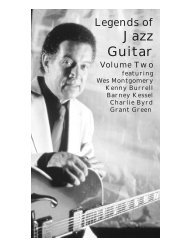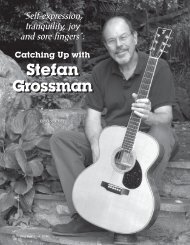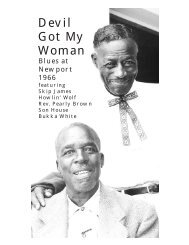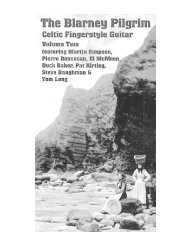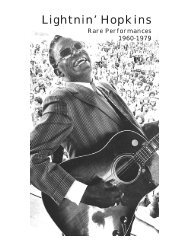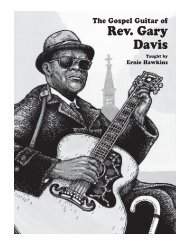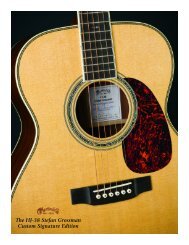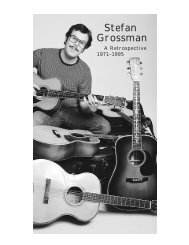Chet Atkins Chet Atkins - Stefan Grossman's Guitar Workshop
Chet Atkins Chet Atkins - Stefan Grossman's Guitar Workshop
Chet Atkins Chet Atkins - Stefan Grossman's Guitar Workshop
You also want an ePaper? Increase the reach of your titles
YUMPU automatically turns print PDFs into web optimized ePapers that Google loves.
Pop Goes the Country performance of “You Needed Me,” a1978 ‘crossover’ hit (#4 country, #1 pop) for Canadian songstressAnne Murray. Note <strong>Chet</strong>’s impeccably clean ‘manual’tremolo and, at the end, harmonics. This is followed by thepop hit “Dance With Me” which features great duet harmonyparts played with Paul Yandell.From a 1980 Pop Goes the Country performance <strong>Chet</strong>plays “Malaguena” from his classical repertoire. From a 1982Pop Goes the Country <strong>Chet</strong> performs “Sukiyaki” followed byKris Kristoferson’s “Me And Bobby McGee”.In 1987, Larry Carlton joined <strong>Chet</strong> on Austin City Limitsfor a study in funk called “Knuckle Buster” which finds <strong>Chet</strong>putting a delay unit to work.<strong>Chet</strong>’s unorthodox yet effective attack on classical guitaris apparent in “Sunrise,” performed on Austin City Limits in1991. He uses a thumbpick as a flatpick and as a close teammateto his index finger for a violin-like staccato.“The first music I ever heard came from my father,” <strong>Chet</strong>wrote in his autobiography. “I would listen as he shaved inthe morning, going through his vocal exercises in a beautifultrained Irish tenor voice.” Later, he would live nearly six years(from age 11 to 17) with James Arley <strong>Atkins</strong> and a youngstepmother in Georgia, where <strong>Chet</strong> perfected the rudimentsof his guitar style. His affection for his father is evident in “IStill Can’t Say Goodbye,” also from Austin City Limits in 1991.“Rainbow,” with the able accompaniment of Paul Yandell,is reprised at the 1992 Merle Watson Festival. Next, <strong>Chet</strong> deliversa deadpan revision of “There’ll Be Some ChangesMade,” complete with fuzz guitar solo and a lyrical lift fromhis friend Mark Knopfler’s “Money For Nothing.” The original1921 song was popularized in 1928 by Sophie Tucker, ‘Lastof the Red Hot Mamas,’ an artist with whom <strong>Chet</strong> wouldseem to have little in common. “Yankee Doodle Dixie” followswhich has become a challenge for all fingerpickers.The medley of ‘picker’s favorites’ is classic ‘country’ <strong>Chet</strong>reminiscent of his early 1950s recordings. Doc Watson, whois an appreciative audience throughout this segment, oftenlikes to introduce “Windy and Warm” by saying, “John D.Loudermilk said he wrote this to get <strong>Chet</strong> back to more countrypickin’.” While Doc popularized the tune for folk audiences,<strong>Chet</strong> introduced it in 1961 on his Down Home album. <strong>Chet</strong>calls “Windy and Warm” “a great fingerpicking tune, one ofmy most successful solos.”13


